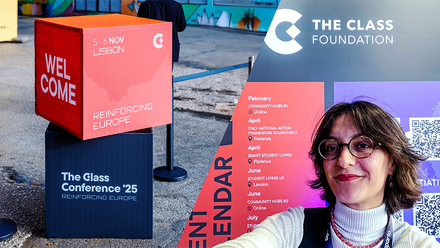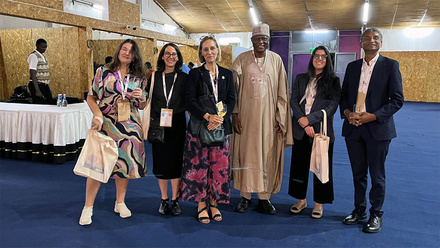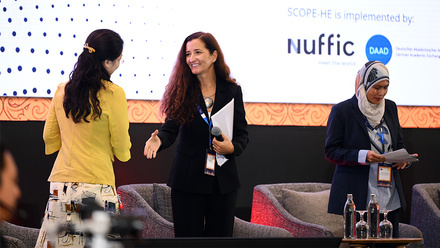2021: moving forward brighter, bolder

As the end of 2021 is almost upon us, we look back at an eventful year and set out our sights on the months ahead.
As a community, we have tackled significant challenges and opportunities with great dynamism and solidarity, and will clearly be called upon to continue learning, growing and problem-solving together in 2022.
Living with ongoing uncertainty
2021 has been a year of swinging moods, the rhythm set by the ebbs and flows of the pandemic tide.
And yet, the response of our community has been extraordinarily steady and invigorating. The breadth and wealth of themes discussed at our Community Summit in March, and at our Community Exchange this past September, have proven with absolute clarity that we can break away from strict crisis management mode and look beyond the contingencies of the pandemic. Although our work will likely continue to be impacted by uncertainty, learning to co-exist with the virus means keeping our sights squarely on the future of international education—a future that we look forward to imagining and exploring together "in full colour" in 2022. In 2021, our community has certainly shown how brilliantly this can be done.
Addressing the certainty of climate change
Imagining the future means first and foremost addressing the looming threat that is embodied in climate change. As the world’s hopes and aspirations hit the wall of realpolitik at the COP26 conference in Glasgow, the compelling need for all sectors of society to embrace bold and brave actions has been made abundantly clear.
Within our community, the clear sense of urgency to act sustainably and contribute to the sustainability agenda is generating momentum and beginning to inform our policies and practices in tangible ways. The EAIE was delighted to contribute to the November 2021 CANIE COP26 Climate Action Week Leaders Forum, and we are keen to support the advancement of a charter to guide collective action in this area. There is much yet to achieve, but the traditional tools of international education are being adapted, and are proving extremely flexible, while new modes of international and intercultural learning and engagement are rapidly evolving and scaling up.
The clear sense of urgency to act sustainably and contribute to the sustainability agenda, is generating momentum and beginning to inform our policies and practices in tangible ways
The European Commission has tuned the new Erasmus+ Programme to the "European Green Deal", striving for carbon-neutrality while continuing to build knowledge, skills, and attitudes that can foster sustainable growth. Institutions are using their partnerships old and new, such as the European University Alliances, to share their best practices and promote sustainability in teaching and research. International networks of educators and students are cropping up across all regions and proposing tactics and strategies to address the environmental crises we face.
Being bold means not shying away from the difficult questions. What is the rightful place of international travel within a field committed to both bridging distances between people and cultures and reducing the global carbon footprint? Important new insights into this and other compelling questions surely await us in 2022.
Expanding inclusion
The pandemic has made the risk of losing contact with the most vulnerable among us all the more apparent. For many, enrolling in tertiary education has become a luxury they can no longer afford; for others who are already in education, the difference between failure and success hinges on myriad privileges, such as having a stable internet connection or a quiet place to study.
From the forests of Belarus to the Mediterranean Sea to the English Channel, the plight of refugees and displaced persons has made its way back onto the radar of news and media outlets. This reminds us vividly of the many tensions and complexities embedded in the phenomena of migration and immigration, and the need for us to be ever- vigilant in the face of serious challenges to access and equity, safety and human rights. In order to enable all students to profit from the transformative powers of education, we must double our efforts to expand access, and provide all the necessary support for student success. Investing in our underrepresented, disadvantaged, and vulnerable students is the right thing to do, and pays a multitude of dividends.
In order to enable all students to profit from the transformative powers of education, we must double our efforts to expand access
Offering all students the same opportunities includes allowing them to take part in mobility and exchange programmes. The 2021–2027 Erasmus+ Inclusion & Diversity Strategy offers new mechanisms to overcome financial, logistical, and cultural barriers preventing our students from participating. Again, virtual tools can be powerful allies, but we must always keep in mind that there are unique contributions that only physical mobility can make to student development.
Amplifying student voices and perspectives
Although serving the interests of students is a primary focus of international education, we can find ourselves immersed in the complex machineries of university administration, where we are at risk of becoming too distant and detached from student interests.
To avert this risk, two things are necessary. Engaging directly with students and student organisations and paying careful attention to data that offer powerful and detailed pictures of students’ conditions, struggles, and aspirations. Equally important is placing students in a position where they can be heard. The EAIE’s special relationship with the Erasmus Student Network, for example, provides exciting opportunities for ongoing information-sharing that can inform our understanding of the student experience in international education.
Leaning into our strategy
The EAIE Strategy 2026 remains our polestar and will continue to provide structure to all our actions. We remain committed to the objectives of bringing our members together to discuss and share their experiences, as well as tackle the grand challenges of the day; offering training and resources; amplifying their voices; and backing them up with data and research. In doing so, the EAIE is set to play a central role in fostering the critical debates that will advance the agenda of international education across Europe in 2022 and beyond.






